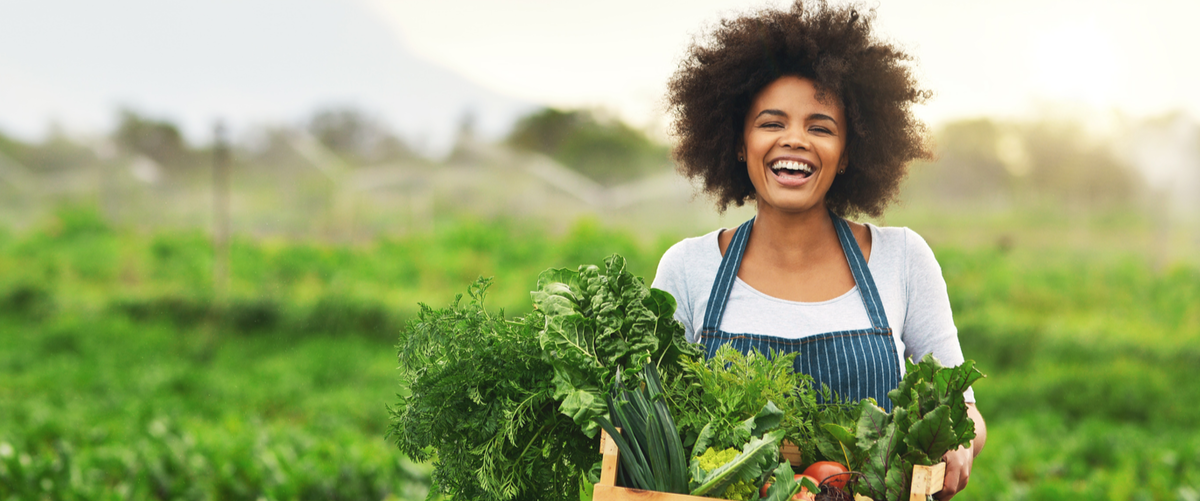How seasonal eating can benefit your health and your pocket
Foods that are in eaten closer to harvest have a higher nutrient value and are often cheaper to buy; and it’s easier to get into your diet than you think

The battle against climate change has forced many of us to rethink our day-to-day habits, and that applies to the food we consume.
Eating seasonally has been dubbed a hero by some in the fight to combat our planet’s rising temperatures, along with a reduction in air miles and the need for less plastic on our shelves.
But there’s another benefit to eating seasonally: it’s good for us. Since 2010, the government’s Department for Environment Food & Rural Affairs (Defra) has been encouraging seasonal eating for its health benefits.
Secretary of State at the time, Caroline Spelman, said: “Choosing seasonal foods can contribute towards a healthy diet and can help the local environment and our farming industry.”
Fast forward to today, and the government is continuing to back seasonal eating campaigns, Eat Seasonably being one of them. Seasonal eating also provides a sliver of excitement to our weekly shop.
The arrival of asparagus on the shelves suggests spring is in full swing and UK grown strawberries are synonyms with summer setting in. But seasonal eating doesn’t strictly mean that you should marry up your meals with the months of the year.
What is seasonal?
“Seasonal eating is when you are consuming certain fruit and vegetables that are in harvest during that season,” Vitality expert Ryan James explains.
“There are also meats and seafoods that are ‘seasonal’, but primarily it is fruit and vegetable that this term refers to. This means that we are consuming more fruit and vegetables that are locally produced and less imported from other countries.”
By eating in this way, we are also more likely to consume foods that have been grown in natural conditions, instead of artificial environments that mimic conditions required for the crop to go grow, says Ryan.
And, as with most things, when crops are allowed to grow in their optimum climate, they are more flavoursome: think oranges from Florida or fresh tomatoes from Italy.
Nutritional value
Not limited to taste, foods that are consumed during their ideal season, and closer to harvest, will contain a higher quantity of nutrients.
That's according to health and wellness advocate Joe Cross, who explains that some vitamins and nutrients will decrease the longer food is stored after harvest. “Some anti-oxidants such as vitamin C, folate and carotenes will rapidly decline when stored for periods of time.
“Fruits and vegetables that are stored for long periods of time due to transportation or to be used at a later date have a reduction in phyto-nutrient content.”
Ryan, meanwhile, notes that by eating a higher volume of different fruit and vegetables throughout the year, our nutritional intake will be boosted. “Instead of repeatedly eating the same five fruit and vegetables all year round, seasonal eating encourages us to cycle foods a bit more which adds variety to, not only the flavours, but the nutrients on offer,” he says.
“Getting a variety of fruits and vegetables will give you a range of vitamins and minerals to help optimise your health.”
Did you know, if you get active and track your activity with a qualifying health insurance or life insurance plan through Vitality, you can get up to 25% cashback on healthy food spend at Waitrose.
And, if you have both a qualifying health insurance or life insurance plan, you can get up to 40% cashback. Terms and conditions apply. Find out more here.
And with nutritional value of fruits and vegetables said to be on the decline due to climate change and waning soil health, according to findings by the University of Texas, it’s never been more important to get the full spectrum of nutrients from the fruit and vegetables that we are eating.
That’s not to say that year-on-year our fruit and veg is going to lose nutrient density two-fold, but it does mean that the average shopper should be looking to eat a much of a varied diet as possible. And mountains don’t have to be moved to achieve this.
How to get your seasonal fix
Ryan recommends adding seasonal foods to dishes that are commonly consumed at the time of year. For example, adding lettuce, beetroot and cucumber to a salad during the summer.
“On the other hand, during colder seasons, you will be looking for warm hearty meals,” he explains. “For soups and stews, you can add butternut squash, leeks and parsnips.”
Mindful Chef Dietitian Clare Gray, meanwhile, explains that the nutrition density of fruit and vegetables is at the optimum immediately after harvest, which declines over time. So, the further the produce has to travel, the less nutritionally valuable it may be.
Unlock the perfect accompaniment to your healthy lifestyle with a delicious discount from Mindful Chef.
Choose from 20 recipes or their Ready to Go range and get your recipes boxes delivered directly to your door.
Find out more: Earn up to £10 off your weekly shop with Mindful Chef | Vitality
“Therefore, time from harvest to consumption has a bearing on nutrient quality,” she notes. As a result, Mindful Chef has shortened its supply chains to ensure its food boxes are more nutritionally valuable. Like James, she recommends incorporating seasonal foods into our diets, and not solely restricting our foods to those that are in season.
“Including foods that have harvested in season and then preserved (frozen, dried, canned or stored) can help you achieve the balance of macronutrients and micronutrients you need,” she adds.
Is there a ‘healthiest’ month?
Ryan claims there isn’t one season of the year that is objectively ‘healthier’ than the other. He says it’s down to the individual and the foods they are choosing to consume.
“Personally, I find it easier to get more seasonal vegetables in during autumn and winter by adding them to casseroles, stews, vegetable traybakes and so on,” he notes.
“However, in summer a simple fruit salad is an easy way to get seasonal fruits such as strawberries, blueberries and raspberries.”
Europe’s diet crisis
2021’s Global Nutrition Report found that in 2018 1-in-4 adult deaths worldwide were found to have a poor diet. An increase of 15% from 2010. And in higher income countries – such as many across Europe – almost one third (31%) of premature deaths in Europe are caused by dietary risks.
Europeans were found to take on 8-9 times the recommended amount of red and processed meat, while the average diary consumption was 20% above suggested levels.
But there’s hope for a healthier future. Vitality research revealed that if the disease burden was reduced by 10% – as a result of individual health improvement – we could increase healthy years lived of UK residents by 729,000 annually.
A cost misconception
Findings published by Cambridge University Press, note that seasonal eating is often viewed as more expensive, less convenient and more time consuming.
According to RSPCA Assured, a not-for-profit dedicated to animal welfare, however, food that is bought out of season is more expensive, given that is has had further to travel.
In 2019, data from Statista, reported that during the summer months, UK-grown strawberries cost around £1.79 per kilo, while in the winter they can go to as high as £3.40 per kilo. This misconception that seasonal eating burns a hole in our pockets, is also something Ryan acknowledges.

“This […] may stem from the quality being higher when they are in season, however, what we often find is that because they [seasonal foods] are grown in abundance and they are more local, which also helps the environment, they are cheaper,” he explains.
“Furthermore, because they are grown in their preferred conditions naturally, there are less costs to grow the particular fruit or vegetable by artificially creating their preferred growing conditions.”
And with the cost of living crisis forcing many of us to tighten our belts, eating seasonally could be one way to help your wallet, as well as your health.
Recent articles

Feeling lonely? 4 ways to combat loneliness this season
For all the fun and frolics of the festive season, for many it can bring an equal amount of heartache. So, why not lift your - or someone else’s - spirits this time of year with these simple tips?

The way to avoid festive burnout? Just say ‘no’
For all of its fun, the festive period can be incredibly stressful too. Hoping to escape burnout this holiday season? Try saying ‘no’, writes Jennifer Wallis

What’s holding women back from getting active this winter?
Less than one in four women hit the recommended weekly exercise guidance – why? We asked women’s personal trainer and founder of LDN MUMS FITNESS, Sarah Campus

